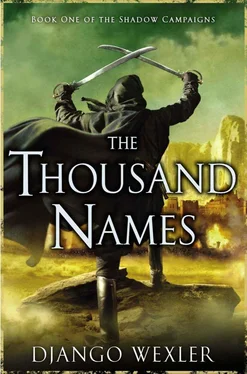Django Wexler - The Thousand Names
Здесь есть возможность читать онлайн «Django Wexler - The Thousand Names» весь текст электронной книги совершенно бесплатно (целиком полную версию без сокращений). В некоторых случаях можно слушать аудио, скачать через торрент в формате fb2 и присутствует краткое содержание. Жанр: Фэнтези, на английском языке. Описание произведения, (предисловие) а так же отзывы посетителей доступны на портале библиотеки ЛибКат.
- Название:The Thousand Names
- Автор:
- Жанр:
- Год:неизвестен
- ISBN:нет данных
- Рейтинг книги:4 / 5. Голосов: 1
-
Избранное:Добавить в избранное
- Отзывы:
-
Ваша оценка:
- 80
- 1
- 2
- 3
- 4
- 5
The Thousand Names: краткое содержание, описание и аннотация
Предлагаем к чтению аннотацию, описание, краткое содержание или предисловие (зависит от того, что написал сам автор книги «The Thousand Names»). Если вы не нашли необходимую информацию о книге — напишите в комментариях, мы постараемся отыскать её.
The Thousand Names — читать онлайн бесплатно полную книгу (весь текст) целиком
Ниже представлен текст книги, разбитый по страницам. Система сохранения места последней прочитанной страницы, позволяет с удобством читать онлайн бесплатно книгу «The Thousand Names», без необходимости каждый раз заново искать на чём Вы остановились. Поставьте закладку, и сможете в любой момент перейти на страницу, на которой закончили чтение.
Интервал:
Закладка:
“They’re not gone,” she told him. “We’d have heard them shouting if they’d really broken.” She looked around at her own men. “Quiet! Graff, get them to be quiet.”
“Quiet!” said Graff, and Folsom took up the cry at a bellow. One by one the men fell silent, all looking toward the barricade, and hands tightened around weapons. Finally, all that could be heard was the gentle creaks and scrapes of the boats riding against the quay, a little splashing from the river, and-quiet conversations, close at hand. Too low to hear the words, but Winter didn’t need to. A horrible picture had sprung full-formed into her mind.
“They’re not gone,” she said. “They split up and spread out along the shore, behind the boats.” While the wall of high-riding barges protected the defenders from enfilading fire from attackers on the riverbank, it also mostly concealed the bank from view. There was only one reason to take up such a position. “They’re going to try to storm us.”
Graff spat a vile curse and turned to the men. “Fix bayonets! Helgoland, you’re on the wall. The rest of you form up-no, stay on your knees! Two ranks, loaded weapons, hold fire until my command!”
“Sir,” Bobby said by Winter’s elbow, “we’d better move back.”
That rankled, but she could see the logic in it. There was no sense in being in the line of fire, where she might prove an impediment to her own men. She and the corporal threaded their way through the double line of kneeling men that Graff was organizing, and took a position beside Folsom and the remaining dozen men of the company, who were still loading muskets as fast as they could ram home powder and ball.
Graff joined them, and just in time. A shout from the men at the barricade warned that the Khandarai were approaching, boiling out of the smoke at a run. There was no careful drum-timed advance this time, just a swarm of brown uniforms and the wicked gleam of fixed bayonets.
The Colonials at the barricade needed no encouragement. They fired at once. At less than twenty yards, the volley had a dreadful impact, bowling men completely off their feet and spraying blood across those who came behind them. The charge had too much momentum to stop, however, and the Auxiliaries came on like maddened hornets, trampling the bodies of their comrades in the narrow confines of the pier.
They reached the boat and started to clamber over, stumbling a little on the still-wet surface. One man lost his footing and crashed back into his fellows, but more made it to the top. For a moment, they were silhouetted against the afternoon sky, brown on blue.
“First rank, fire !”
Graff timed it nicely. The men on the barricade had thrown themselves flat after firing their volley, and with the range barely over ten yards the Colonials had a target any game hunter would have envied. The roar of the volley was louder than thunder, and the men standing on the boat jerked or spun away, sliding off the curved wood to land bonelessly on the pier.
There were more behind them, though, pressed forward by the tight confines and the momentum of the rear ranks still pouring onto the quay. Graff waited until a few had gotten their footing before calling for the second rank’s volley, which cut them down like wheat. More tried coming over on their bellies, slithering across on the slick undersurface of the upturned boat, but the men who’d crouched in the shadow of the barricade grabbed these brave souls as they emerged and dragged them to the ground to apply their bayonets.
More dangerous were the shots that were starting to come from the Auxiliaries packed against the barricade. Cover worked both ways, after all-now it was Winter’s men who were exposed on the naked stones of the quay, while the Khandarai had the boat to hide behind. A man in the second line jerked backward with a screech, toppling against one of the barges. The rest, having retrieved loaded muskets from the fast-diminishing stock, fired back in an effort to force the Auxiliaries to keep their heads down.
That’s it, Winter thought. I’m out of tricks. Her men wouldn’t flee-couldn’t, really, with their backs literally against a wall-but at this rate they’d be wiped out. She looked at the tight-packed mob of soldiers on the other side of the boat and wished, absurdly, for a cannon-a single load of canister would have cleared the quay. Of course, if we could have gotten any guns across the river we wouldn’t be having this problem-
She blinked in disbelief. The mob was breaking up. Auxiliaries were starting to run, first those at the rear, then the men closer to the front as the pressure from behind started to ease. The rest of the Colonials saw it, too. Cheers started to rise again, louder and louder.
But-they finally had us! Why. .
It wasn’t until Graff let out a satisfied sigh that Winter finally turned around. The end of the quay-the only space through which she’d been able to get a view of the river-was now blocked by one of the high-sided grain barges. The front hinged down to make a ramp, and men in blue were pushing past the cheering defenders, weapons at the ready. As the fighting faded, Winter could hear firing elsewhere along the riverbank.
Behind the first wave of fresh troops came a neat figure in dress blues, eagles glittering on his shoulders. His deep gray eyes took in the scene on the quay for a few moments, and then he turned to Winter and smiled. Winter, only partly recovered from her shock, managed a hesitant salute.
“Well done, Lieutenant,” said Colonel Vhalnich. “Very well done indeed.”
Chapter Eleven
MARCUS
“-Then he’d dragged a boat across the pier, to make a sort of breastwork,” Janus said, cheerful as a kid with a new toy. “You really ought to have seen it, Captain, it was a neat piece of work. Brown uniforms lying on the other side as far as the eye could see, and not even two dozen of ours so much as hurt.”
“That’s why you put them there, wasn’t it?” Marcus said.
“I expected them to have to keep off a few raiders. It was pure bad luck there happened to be four companies within an hour’s march. Most commanders would have packed their men onto the boats and rowed for it when they saw the odds.” He paused. “Most sensible commanders, anyway.”
Marcus could have done without the reminder that they’d nearly forfeited the campaign before they’d begun, just because a few hundred Auxiliaries had been in the wrong place at the wrong time. A symptom of inadequate intelligence gathering, of course. The lack of cavalry for reconnaissance had been a handicap from the beginning, but it made Marcus more nervous the closer they got to Ashe-Katarion.
“It may not have the sweep of Noratavelt or the romantic pageantry of Ilstadt, but if you ask me, there’s as much artistry in a well-executed skirmish as any proper battle. Or in any painting or sculpture, if it comes to that.” He cocked his head. “Another monograph, when I get the free time. ‘War as Art.’ I think the general’s job is harder than the painter’s; canvas doesn’t fight back, after all.”
Art had never been Marcus’ strong point. “Have you thought about what you’re going to say to the prince?”
“I’m going to tell him to look under his loincloth and figure out if he’s a man or a eunuch,” Janus said. “And if he does find a pair of balls, I’m going to suggest that he learn to use them.”
Marcus stopped in his tracks, so that the colonel walked a few paces farther before turning. Janus sighed at the expression he saw.
“No,” Janus said. “Not really. Has anyone ever told you, Captain, that you need to work on your sense of humor?”
“I’m not used to needing one around senior officers,” Marcus muttered. Janus, who had very good hearing, chuckled broadly.
Читать дальшеИнтервал:
Закладка:
Похожие книги на «The Thousand Names»
Представляем Вашему вниманию похожие книги на «The Thousand Names» списком для выбора. Мы отобрали схожую по названию и смыслу литературу в надежде предоставить читателям больше вариантов отыскать новые, интересные, ещё непрочитанные произведения.
Обсуждение, отзывы о книге «The Thousand Names» и просто собственные мнения читателей. Оставьте ваши комментарии, напишите, что Вы думаете о произведении, его смысле или главных героях. Укажите что конкретно понравилось, а что нет, и почему Вы так считаете.











